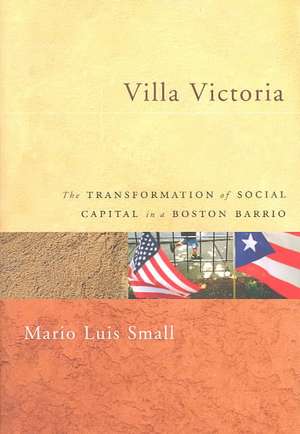Villa Victoria: The Transformation of Social Capital in a Boston Barrio
Autor Mario Luis Smallen Limba Engleză Paperback – 5 iul 2004
For decades now, scholars and politicians alike have argued that the concentration of poverty in city housing projects would produce distrust, alienation, apathy, and social isolation—the disappearance of what sociologists call social capital. But relatively few have examined precisely how such poverty affects social capital or have considered for what reasons living in a poor neighborhood results in such undesirable effects.
This book examines a neglected Puerto Rican enclave in Boston to consider the pros and cons of social scientific thinking about the true nature of ghettos in America. Mario Luis Small dismantles the theory that poor urban neighborhoods are inevitably deprived of social capital. He shows that the conditions specified in this theory are vaguely defined and variable among poor communities. According to Small, structural conditions such as unemployment or a failed system of familial relations must be acknowledged as affecting the urban poor, but individual motivations and the importance of timing must be considered as well.
Brimming with fresh theoretical insights, Villa Victoria is an elegant work of sociology that will be essential to students of urban poverty.
This book examines a neglected Puerto Rican enclave in Boston to consider the pros and cons of social scientific thinking about the true nature of ghettos in America. Mario Luis Small dismantles the theory that poor urban neighborhoods are inevitably deprived of social capital. He shows that the conditions specified in this theory are vaguely defined and variable among poor communities. According to Small, structural conditions such as unemployment or a failed system of familial relations must be acknowledged as affecting the urban poor, but individual motivations and the importance of timing must be considered as well.
Brimming with fresh theoretical insights, Villa Victoria is an elegant work of sociology that will be essential to students of urban poverty.
Preț: 259.30 lei
Nou
Puncte Express: 389
Preț estimativ în valută:
49.62€ • 51.62$ • 40.97£
49.62€ • 51.62$ • 40.97£
Carte tipărită la comandă
Livrare economică 14-28 aprilie
Preluare comenzi: 021 569.72.76
Specificații
ISBN-13: 9780226762920
ISBN-10: 0226762920
Pagini: 246
Ilustrații: 1 map, 1 line drawing, 2 figures, 6 tables
Dimensiuni: 152 x 229 x 20 mm
Greutate: 0.37 kg
Ediția:1
Editura: University of Chicago Press
Colecția University of Chicago Press
ISBN-10: 0226762920
Pagini: 246
Ilustrații: 1 map, 1 line drawing, 2 figures, 6 tables
Dimensiuni: 152 x 229 x 20 mm
Greutate: 0.37 kg
Ediția:1
Editura: University of Chicago Press
Colecția University of Chicago Press
Notă biografică
Mario Luis Small is associate professor in the Department of Sociology at the University of Chicago.
Cuprins
Preface
Acknowledgments
1. How Does Neighborhood Poverty Affect Social Capital?
2. Villa Victoria and Boston's South End
3. The Rise and Decline of Local Participation, Part 1: Social Organization Theory
4. The Rise and Decline of Local Participation, Part 2: Cohorts and Collective Narratives
5. The Ecology of Group Differentiation
6. Social Capital and the Spatialization of Resources
7. A Labyrinth of Loyalties
8. Social Capital in Poor Neighborhoods
Epilogue
Appendix
Bibliography
Index
Acknowledgments
1. How Does Neighborhood Poverty Affect Social Capital?
2. Villa Victoria and Boston's South End
3. The Rise and Decline of Local Participation, Part 1: Social Organization Theory
4. The Rise and Decline of Local Participation, Part 2: Cohorts and Collective Narratives
5. The Ecology of Group Differentiation
6. Social Capital and the Spatialization of Resources
7. A Labyrinth of Loyalties
8. Social Capital in Poor Neighborhoods
Epilogue
Appendix
Bibliography
Index
